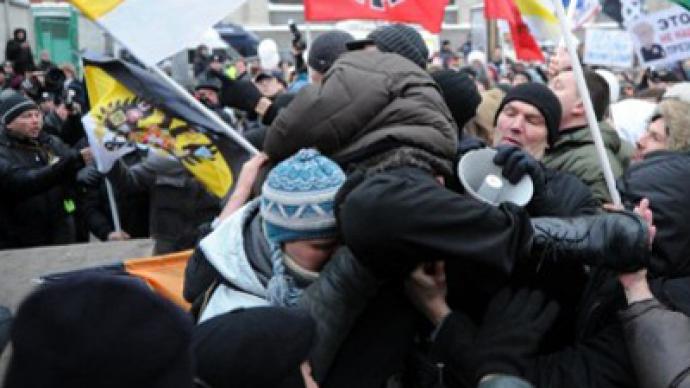December 2011: Information War against Russia

Moscow’ opposition rally of December 24th marked a new stage in the information warfare against Russia. Political analyst Igor Panarin believes the society’s dissatisfaction is being manipulated through the media to undermine Russia’s statehood.
In the article below, Panarin explains his view.A dirty media campaign against Russia was unleashed in August 2008, spearheaded by American and British news networks. The events of December 2011 are very similar to those of August 2008. Only this time, media manipulation of public opinion is much more subtle and sophisticated, wherein the mudslingers smartly take advantage of the Russian government’s actual mistakes, as well as the government’s inaptitude in online media campaigning. Having watched Western TV coverage of the December protests in Moscow, we can say that all the reporters chose to go down the same path of exaggeration: they tried to make the protests look bigger and more significant than they really were. The latest parliamentary election in Russia has shown that left-wing parties, such as Fair Russia and the Communist Party, have significantly gained in popular support. At the same time, the liberal opposition represented by the Yabloko party has suffered yet another crushing defeat. In spite of these facts, the Western media are trying to paint their own picture of what Russian voters want. Russia’s radical opposition groups are headed by politicians who have no influence with the Russian society, having discredited themselves by nearly ruining the country while being in charge in the 1990s. About 60 percent Russians explicitly state their lack of confidence in these people. Nevertheless, American and British media are implying in their reports that opposition leaders enjoy nationwide support. This is media manipulation at its finest. (It should be noted, however, that German news outlets have been much more objective in their coverage of Russia’s domestic politics.)It is hardly a coincidence that many of the participants of Moscow’s two opposition rallies were holding up signs in English, which were broadcast with close-ups by British and American TV stations. One is bound to get the impression that there is some truth to the notion that Russian opposition rallies are covertly encouraged by the American and British governments – after all, there is a US government grant for “Russia’s civil society development” ($190 million went towards that cause in 2011).December 2011 marks a new stage in the information warfare campaign against Russia. Its ultimate objective is to destroy Russia’s statehood, employing the methods used during Russia’s Socialist Revolution of 1917 and the fall of the Soviet Union in 1991, along with some of the latest inventions of NATO propaganda (such as the “media supercarrier”: an entire ship packed with broadcasting equipment and journalists that deployed near Tripoli to provide information support for the NATO campaign in Libya) tested in campaigns against Libya and Syria. Social networks proved to be an efficient tool for destabilizing political regimes over the course of Middle East revolutions. The next step was to use the technique in Russia, and the Russian authorities turned out to be unprepared for the attack (they had been gearing themselves up against a hypothetical “Orange revolution,” similar to the one staged in Ukraine in 2004, not the Middle East scenario of 2011). Social networks are the main mechanism for mobilizing protesters for rallies in Russia. Meanwhile, the Russian government does not have a system in place for countering media assaults. This is a very dangerous situation, as the information warfare against Russia may become even more intense in 2012, with the presidential race already being looked upon as controversial. Russia needs a reliable system in place in order to counter such media aggression. A system that would be efficient in the current situation, aimed at developing the Internet. A system comprised of governmental institutions as well as non-government structures. The key components of the system are: 1. The Presidential State Council on information policy with representation of the government’s executive branch, all factions in the State Duma, the business community, and the general public. 2. The position of information counteraction Advisor to the Russian President.3. A state-owned internet corporation. 4. An international governmental media corporation that would represent Russia abroad and create a positive image of the country. This network should be accountable to the president.A meticulous dialogue with journalists from the Echo of Moscow radio station and other liberal media is also needed. I am convinced that many of these professionals want to see a strong Russian state, rather than chaos.Because of the information war in the Middle East, the situation in many Arab countries has been destabilized, leading radical groups to power. It resulted in lower living standards for the majority of people and overall chaos in the region. It would be great if we could avoid this scenario in Russia in 2012.
Prof. Igor Panarin, Doctor of Political Sciences, for RT
The statements, views and opinions expressed in this article are solely those of the author and do not necessarily represent those of RT.












